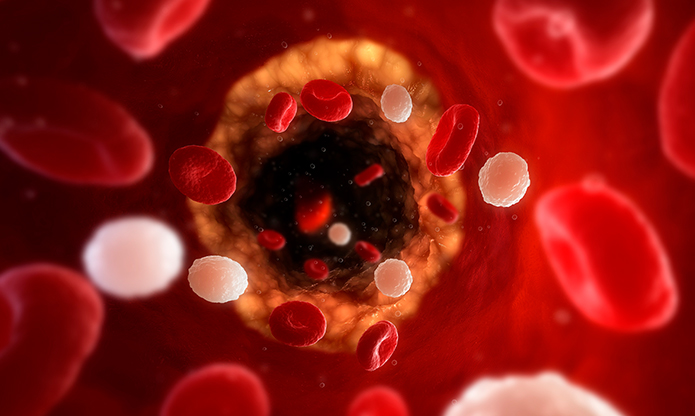Globally, cardiovascular diseases due to atherosclerosis – the build-up of plaque in arteries – are the leading cause of death. A new Danish-Spanish research collaboration aims to develop methods to detect atherosclerosis at earlier ages and encourage prevention. Denmark’s Novo Nordisk Foundation has granted up to EUR 23 million to cover the first 2.5 years of the REACT initiative. The initiative is expected to run for 8 years in total.
One in three people around the world die from cardiovascular disease, which is mainly caused by atherosclerosis. This makes atherosclerosis the leading cause of death globally. Additionally, many people live with serious manifestations of atherosclerosis, for example, following a heart attack or a stroke. Atherosclerosis not only represents a significant burden for these individuals, but also a heavy burden on healthcare systems and societies in all parts of the world.
“Atherosclerosis may develop from an early age and often remains ‘silent’, that is, without symptoms, for many years until it suddenly hits, for example with a heart attack,” says Dr. Henning Bundgaard, Chief Physician and Professor at the Department of Cardiology at Rigshospitalet, Copenhagen, Denmark, and leader of the project.
“In REACT, we hope to identify new means to detect atherosclerosis at earlier stages and at a younger age, that is during the ‘silent’ period.”
Aiming for precision treatment
REACT is a collaboration between Danish hospitals and Centro Nacional de Investigaciones Cardiovasculares (CNIC), a Spanish research center, world-leading in imaging diagnostics for atherosclerosis. CNIC and Rigshospitalet have collaborated for many years on the development of new and better methods for early detection of cardiovascular disease.
“At present, we use factors like blood pressure, cholesterol levels, age, and lifestyle to estimate the risk of atherosclerosis,” says Dr. Borja Ibáñez, Scientific Director of CNIC, cardiologist at Fundación Jiménez Díaz hospital, and leader of the Spanish part of the study. “By contrast, REACT will develop – at scale – methods to directly visualize the disease (atherosclerosis).”
Today, the treatment of atherosclerosis is largely the same in all cases, but the two professors anticipate a future with far better, individually tailored precision treatment of many more patients and from earlier ages.
A total of 16,000 individuals — 8,000 from each country — aged 20-70 will be included in the first phase of the project. The program includes imaging of arteries in the neck and groin and of the coronary arteries, as well as genetic analysis and blood tests.
The goal is prevention
The purpose of the first phase of REACT is to establish the prevalence of atherosclerosis in various sites in the body and to identify optimal methods for detection of atherosclerosis – and its risk factors – from an early age and at early stages, with the ultimate goal to enable prevention early in the ‘silent’ phase. Prevention may be pharmacological or involve lifestyle changes, the exact method being dependent on the individual’s risk profile.
“The study represents a shift in paradigm from the traditional treatment of diseases to detection and prevention at early stages, that is, before serious or potentially life-threatening disease presents. At the Novo Nordisk Foundation, we strongly support this development,” says Martin Ridderstråle, Senior Vice President at the Foundation.
“A crucial purpose of REACT is to find out who should be recommended which type of treatment and when, or for that matter, who should be advised against treatment: what we call precision medicine.”
Depending on the results of the first phase of REACT, the next step – phase 2 – is to expand the collaboration and to investigate if treatment of early-detected atherosclerosis is effective and will prevent the many lives lost. This part of the project would last 5.5 years.
About Rigshospitalet
Rigshospitalet is a highly specialised hospital that serves all of Denmark, providing treatment, research, innovation, and training at an international level. Working with national and international healthcare stakeholders, Rigshospitalet contributes to developing the overall healthcare system so that all patients, irrespective of the rarity or complexity of their illness, receive high-quality treatment.
About CNIC
The CNIC is an affiliate center of the Carlos III Health Institute (ISCIII), an executive agency of the Spanish Ministry of Science, Innovation, and Universities. Directed by Dr. Valentín Fuster, the CNIC is dedicated to cardiovascular research and the translation of the knowledge gained into real benefits for patients. The CNIC has been recognized by the Spanish government as a Severo Ochoa center of excellence (award CEX2020-001041-S, funded by MICIN/AEI/10.13039/501100011033). The center is financed through a pioneering public-private partnership between the government (through the ISCIII) and the Pro CNIC Foundation, which brings together 12 of the most important Spanish private companies.









